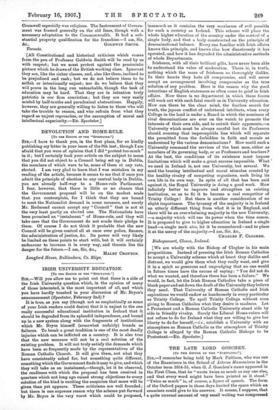IRISH UNIVERSITY EDUCATION.
[To ma Emma Or THE "Sviscrivoal Sra,—Will you allow me to point out that there is a side of the Irish University question which, in the opinion of many of those interested, is the most important of all, and which you have hardly touched in your discussion of Mr. Bryce's announcement (Spectator, February 2nd) ?
It is true, as yon say (though not as emphatically as some of your Irish readers could desire) that it is unjust to the one really successful educational institution in Ireland that it should be degraded from its splendid independence, and bound tip in a new system along with the fragments of institutions which Mr. Bryce himself (somewhat unfairly) brands as failures. To break a great tradition is one of the most deadly injuries which can be inflicted on a country. It is also true that the new measure will not be a real solution of the existing problem. It will not truly satisfy the demands which have been so frequently made by the representatives of the Roman Catholic Church. It will give them, not what they have consistently asked for, but something quite different, something which the Government finds it easy to give, and which they will take as an instalment—though, let it be observed, the readiness with which the proposal • has been received in quarters which not long ago raised strong objections to every solution of the kind is exciting the suspicion that more will be given than yet appears. These criticisms are well founded ; but there is one supreme reason why the scheme pat forward by Mr. Bryce is the very worst which could be proposed,
inasmuch as it contains the very maximum of evil possible for such a country as Ireland. This scheme will place the whole higher education of the country under the control of a single body, and that a body constructed on the principle of denominational balance. Every one familiar with Irish affairs knows this principle, and knows also how disastrously it has operated, and how it has degraded the administrative methods of whole Departments.
Irishmen, with all their brilliant gifts, have never been able to understand the value of moderation. There is, in truth, nothing which the mass of Irishmen so thoroughly dislike. In their hearts they hate all compromise, and will never accept an arrangement involving compromise as the true solution of any problem. Here is the reason why the good intentions of English statesmen so often come to grief in Irish affairs. Now there is no department in which these forces will work out with such fatal result as in University education. How can there be the clear mind, the fearless search for truth, the joyous conflict of unfettered intellects, when every College in the land is under a Board in which the nominees of rival denominations are ever on the watch to promote the interests of their own side, and to outwit their opponents,—a University which must be always careful lest its Professors should overstep that imperceptible line which will separate the permitted from the forbidden in faith and morals as understood by the various denominations P How could such a University command the services of the beat men, either as members of its governing body, or as Professors and teachers ? At the best, the conditions of its existence must impose limitations which will make a great success impossible. What we need in Ireland is, not one University, but several. We need the bracing intellectual and moral stimulus created by the healthy rivalry of competing organisms, each living its own life in its own way. In spite of all that has been said against it, the Royal University is doing a good work. How infinitely better to improve and strengthen an existing institution, so as to fit it to become a real competitor of Trinity College ! But there is another consideration of no slight importance. The tyranny, of the majority is in Ireland an utterly different thing from what it is in England, and there will be an overwhelming majority in the new University, —a majority which will use its power when the time comes. It is proposed to give to higher education in Ireland a single bead—a single neck also, let it be remembered—and to place it at the mercy of the majority.—I am, Sir, &c., [We are wholly with the Bishop of Cloglier in his main propositions. Instead of pressing the Irish Roman Catholics to accept a University scheme which at heart they dislike and distrust, we would give them what they really want, and give it in a spirit so generous and ungrudging that no one would in future times have the excuse of saying : "You did not do what we wanted, and therefore there has been a failure." We would, in fact, let the Irish Roman Catholics take a piece of blank paper and set down the draft of the University they believe they need. That University of Roman Catholic and Irish aspirations we would endow as handsomely in every particular as Trinity College. To spoil Trinity College without even giving to Roman Catholics what they desire is madness. Let a Protestant and a Roman Catholic University stand side by aide in friendly rivalry. Surely the Liberal Home-rulers will not refuse to do for Ireland what they are willing to give her liberty to do for herself,—i.e., establish a University with an atmosphere as Roman Catholic as the atmosphere of Trinity College is alleged by the Roman Catholic Bishops to be Protestant—En. Spectator.]






































 Previous page
Previous page